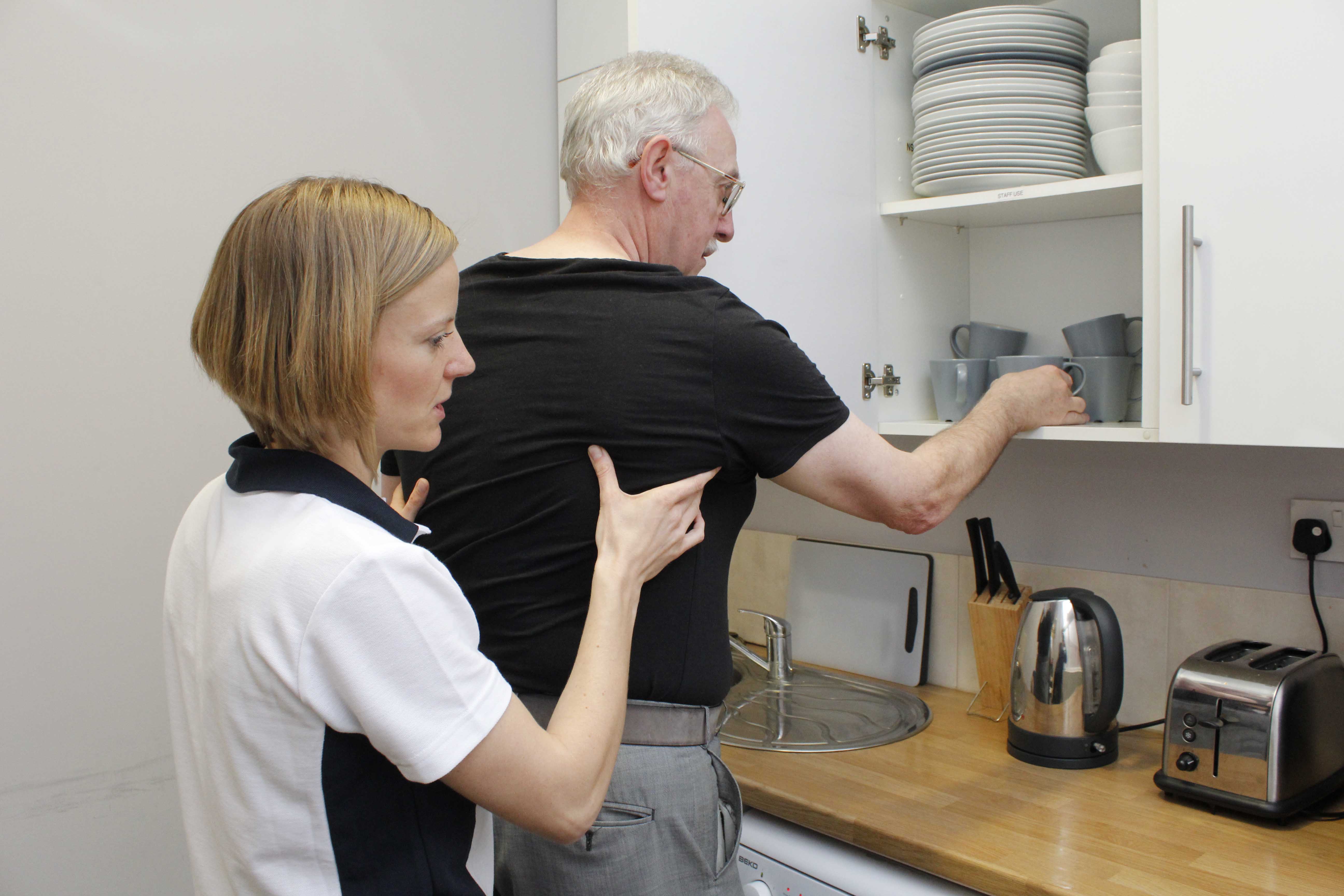Transfer rehabilitation
A transfer involves moving from one place to another. The physiotherapists at Physio.co.uk are experts at helping people with neurological conditions transfer efficiently to maximise their independence and quality of life.
 Above: Functional movement rehabilitation exercises supervised by a specialist neurological physiotherapist
Above: Functional movement rehabilitation exercises supervised by a specialist neurological physiotherapistAt Physio.co.uk our physiotherapists use different types of transfer solutions depending on the individual’s requirements. Transfer solutions we use include mechanical, non-mechanical and transfer techniques.
Mechanical transfer equipment
At Physio.co.uk, our physiotherapists are trained at using a variety of mechanical equipment to transfer an individual from a bed or chair or to assist an individual when standing. Our physiotherapists will also show you how to use your equipment effectively and safely and may include:
- Hoists and slings – a full hoist takes the full weight of a person to allow easier and safer lifting and transferring from one position to another. This also reduces the risk of falling and injuries.
- Standing hoist or Rota stand - assists an individual to stand and weight bear with support. Standing hoists can assist a person to balance and weight bear safely and confidently. This type of hoist can also be used to transfer a person from chair to chair, or to allow a carer to attend to toileting and dressing needs. Regular weight bearing in a standing hoist or rota stand has many benefits which include; helping with breathing, increasing circulation to important internal organs, keeping bones strong, improving muscle strength and facilitating standing balance.
- Sit to stand chairs – have adjustable heights to help an individual to stand from sitting.
- Stair lifts – assists an individual up or down the stairs, consisting of a moveable chair which runs along an inclined rail.
Non mechanical equipment
Non mechanical equipment assist people with everyday activities such as transferring in and out of bed/on and off a chair, walking and climbing the stairs. Our physiotherapists at Physio.co.uk provide and teach people how to use the equipment securely and efficiently within their own home. Non mechanical equipment may include:
- Bed ladder – assists an individual to pull themselves into a sitting position.
- Monkey pole – assist an individual to change positions while in bed and to aid in transfer from bed to chair.
- Bed levers – assist an individual to rise from a lying to a sitting position.
- Grab rails – attached to a wall and assists an individual when walking or stepping.
- Walking aids – allow an individual to mobilise safely and effectively. Walking aids may include walking sticks, walking frames, walking rollators and crutches.
- Slide board transfers - involve using a slide board to transfer to a car, bed, or chair. This can help wheelchair users transfer without standing.
- Slide sheets - can assist people with bed mobility.
- Transfer belts - provides a carers/family members with a secure handhold on an individual for safe transfers
Transfer Techniques
Physiotherapy can also teach you to transfer safely with everyday activities such as getting on and off the toilet, getting in and out of the bath and in and out of the car. Effective transfers require awareness of body position and motion in space, as well as muscle strength, coordination and trunk, head and neck control. People with neurological conditions often find it difficult to establish a stable base of support in sitting, standing and walking.
- Stand and swap transfers – the person partly stands and then the physiotherapist changes the surface the person wishes to sit on.
- Step around transfers – the person stands and the physiotherapist teaches the person to step around to the new surface.
- Pivot transfers – the person partly stands, turns or pivots, and then sits down on the new surface.
- Exercises to strengthen muscles
- Lateral weight shifting in sitting or standing to encourage you to transfer weight
- Changing the height of the surfaces
- Adding or removing support such as armrests
- Increasing the awareness of your body?s midline to improve balance
For more information about transfer rehab or to make an appointment with us, please contact Physio.co.uk today by calling 0330 088 7800. Alternatively, you can make an appointment online today!

 0330 088 7800
0330 088 7800


































